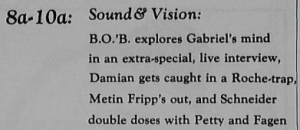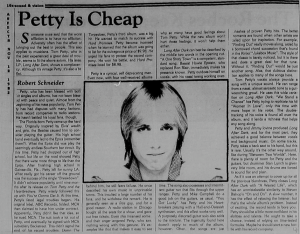Petty Is Cheap
By Robert Schneider
Albany Student Press - November 12, 1982
Someone once said that the worst affliction is to have no affliction. Adversity often has the effect of bringing out the best in people. This also applies to musicians. Tom Petty, who in the past experienced a great deal of trouble, seems to fit the above axiom. His latest LP, Long After Dark, shows a complacency. Although it's vintage Petty, it's also a bit flat.
Petty, who has been blessed with both hit singles and albums, has not been blessed with peace and quiet. Almost from the beginning of his mass popularity, Tom Petty has had disputes with many factions, from record companies to radio stations. He hasn't battled his loyal fans, though.
The Florida-born Petty came up the hard way. Originally inspired by Elvis' wealth and girls, the Beatles caused him to consider playing the guitar. His high school band eventually led to the Epics (remember them?). What the Epics did was play the seemingly endless Southern bar circuit. By this time, Petty had dropped out of high school, but life on the road showed Petty that there were more things to life than the Epics. After finishing high school in Gainseville, Fla., Petty left for sunny LA. What really got his career off the ground was the success of the single "Breakdown." It didn't achieve popularity until nine months after its release on Tom Petty and the Heartbreakers. Petty wisely followed this up with You're Gonna Get It. At this time, Petty's fated legal troubles began. His original label, ABC Records, folded. MCA then claimed to have him under contract. Apparently, Petty didn't like that idea, so he sued MCA. The suit took a lot out of Petty, and eventually he signed with MCA subsidiary Backstreet. This didn't signal the end of his record troubles. Damn the Torpedoes, Petty's third album, was a big hit. He wanted to match its success with Hard Promises. Petty became incensed when he learned that the album was going to list for the outrageous price of $9.98. He urged his fans to protest the record company. He won his battle, and Hard Promises listed for $8.98.
Petty is a cynical, self deprecating man. Even now, with four well-received albums behind him, he still fears failure. He once described his own music in unprintable terms. This insulted a large number of his fans, and he withdrew the remark. He is generally seen as a nice guy, and for a good reason. A radio station in Chicago bought all the seats for a show, and gave out free tickets. Even this incensed some, and their anger angered Petty, who saw nothing wrong with this gesture. It's examples like that that makes it easy to see why so many have good feelings about Tom Petty. While the new album won't hurt those feelings, it won't help them either.
Long After Dark can best be described by the middle two words in the opening cut. "A One Story Town" is a competent, standard song. Bassist Howie Epstein, who replaced Ron Blair, immediately makes his presence known. Petty outdoes himself on vocals, with his nasal twang working overtime. The song also possesses and intermittent guitar run that flits through the upper ranges. Petty and Mike Campbell do a good job on the guitars, as usual. "You Got Lucky" has Petty and his Heartbreakers playing with a Hall-and-Oatesish synthesizer, and this effect works very well. A purposely distorted guitar solo also adds to the mixture. The ingenuity found here doesn't apply to much of the album, however. Often, the songs are just rehashes of proven Petty hits. The better moments are found when other artists are called upon for inspiration. For example, "Finding Out" really moves along, aided by a borrowed chord succession that's found in the Kinks' "Jukebox Music." The style of that classic is barely noticed, but it is there and does a great deal for that tune. Without it, "Finding Out" would be just another song. Alas, that dubious distinction applies to many of the songs here.
Tom Petty's vocals always provide a song with a unique sound. He can range from a nasal, almost sarcastic tone to a gut-wrenching growl. He uses this wide variation on Long After Dark. "We Stand a Chance" has Petty trying to replicate his hit ""Women In Love," only this time with more hope in his voice. The double-tracking of his voice is found all over the album, and it lends a richness that helps any song along.
Petty and Jimmy Iovine produced Long After Dark, and for the most part, they achieved a good balance between vocals and background music. On some tracks, Petty takes a back seat to his band, but this is rare. Usually it's the other way around, like during "Between Two Worlds." Here, there is plenty of room for Petty and the guitars, but drummer Stan Lynch is given very little room, and his drums are forced to sound flat and plain.
As i it was an attempt to cover up for all the previous blandness, Petty closes Long After Dark with "A Wasted Life," which has an unmistakable similarity to Steven Bishop's "On and On." A slow number, it has the effect of relaxing the listener, but that's the whole album's problem. Instead of exciting, the record tends to bore you. Petty should be a little more confident in his abilities and talents. He ought to take a chance, instead of relying on time-tested formulas. Maybe he should start a new battle with his record company.


